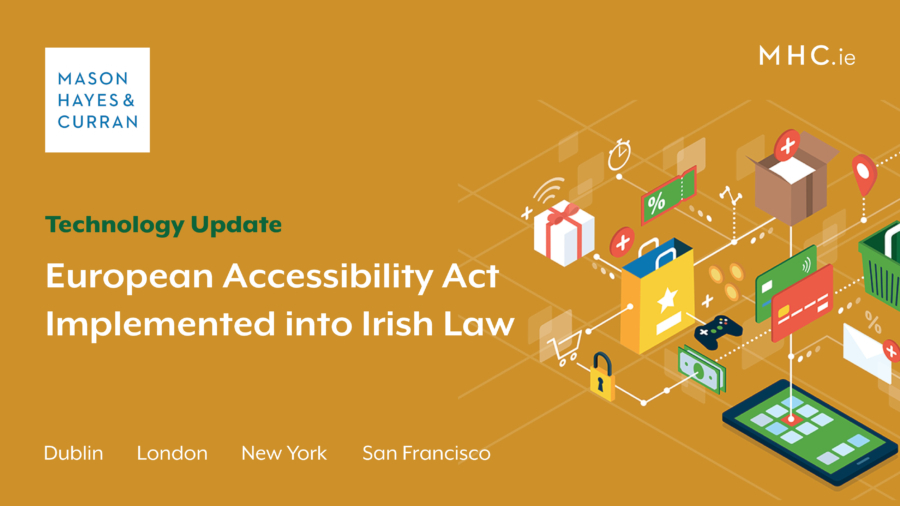European Accessibility Act Implemented into Irish Law
Overview of the Irish implementing measures

The European Accessibility Act has been implemented into Irish law and will apply from June 2025. The EAA ensure products and services within its scope are accessible to persons with disabilities. Our Technology team considers some of the key points from Ireland’s implementing measures and what in-scope businesses should do in advance of its coming into force.
In an important development, the European Accessibility Act (EAA) has been implemented into Irish law through the European Union (Accessibility Requirements of Products and Services) Regulations 2023. The EAA is significant for businesses in a number of sectors and industries including e-commerce, telecoms, banking, transport and for companies in the technology products space. It will apply from 28 June 2025 and will introduce accessibility requirements for in-scope products and services. These have been outlined in previous updates here and here.
At its core, the EAA is about ensuring products and services within its scope are accessible to persons with disabilities. It does this by setting baseline accessibility requirements for all in-scope products and services with further, specialised requirements for specific products and services. These may require companies who supply in-scope products and services to make amendments to their products and services. It is therefore important for these companies to start planning for when the EAA becomes effective in 2025.
Clarity on the EAA in Ireland
The Regulations provide greater clarity on the effect of the EAA in Ireland. In particular, the Regulations confirm that the EAA will not be extended to the built environment for all in-scope services. Additionally, the Regulations confirm that Ireland will be implementing an exemption for self-service terminals, such as ATMs and payment terminals, which are lawfully used by service providers for the provision of services before the Regulations come into force. Service providers may continue to use these until the end of their economically useful life, up to a maximum of 20 years after their entry into force.
Market surveillance authority and compliance authorities
The Regulations clarify who the relevant authorities are for ensuring compliance with the accessibility requirements. The Competition and Consumer Protection Commission (CCPC) is the market surveillance authority for products which are subject to the EAA.
The compliance authorities for services covered under the EAA are more diverse as follows:
Services |
Authority |
In-scope electronic communications services |
Commission for Communications Regulation |
Services providing access to audiovisual media services |
Coimisiún na Meán |
In-scope elements of air passenger transport services |
Irish Aviation Authority |
In-scope elements of bus, rail and waterborne passenger transport services |
National Transport Authority |
Consumer banking services |
Central Bank of Ireland |
E-books and dedicated software and e-commerce services |
CCPC |
Answering emergency communications to the single European emergency number ‘112’ |
Commission for Communications Regulation |
The National Disability Authority is also given a special status under the Regulations to advise the relevant authorities on the accessibility requirements under the EAA and the Irish Regulations.
Enforcement and penalties
The Regulations give enforcement powers to the market surveillance authority and compliance authorities. These include the power to issue directions to businesses to comply with its provisions. In addition, they outline a procedure for individual consumers to take an action against businesses in the Irish courts where the consumer believes that the business is not complying with the Regulations. They also provide for public bodies and private associations, organisations or other legal entities with a legitimate interest to support these consumer actions with their approval. This is a particularly noteworthy development as it means private individuals, perhaps backed by interest groups, can bring court proceedings directly.
The Regulations also provide for penalties for breaches of its requirements as follows:
- On summary conviction, a class A fine (€5,000) or imprisonment of up to 6 months or both
- On conviction on indictment, a fine of up to €60,000 or imprisonment of up to 18 months or both
Both companies and their directors, managers, secretaries and other officers can be found guilty of an offence under the Regulations. It will be a defence for a person, including a company, charged with an offence if they can prove that they exercised due diligence and took all reasonable precautions to avoid the commission of the offence.
Harmonised standards
Under Article 15(1) of the EAA, products and services which conform with harmonised standards published in the Official Journal of the European Union are presumed to conform with the accessibility requirements of the EAA, where the standards or parts of the standards cover those requirements. The European Commission has formally requested the drafting of standards in support of the EAA. This request provides for the following existing standards to be revised:
- EN 301 549 Accessibility requirements for ICT products and services
- EN 17161:2019 Design for All - Accessibility following a Design for All approach in products, goods and services - Extending the range of users
- EN 17210 Accessibility and usability of the built environment - Functional requirements
The Regulations confirm that products and services which comply with these standards will be presumed to be in conformity with the Regulations. Therefore, those standards may be useful for businesses to consider relating to their compliance with the EAA.
Conclusion
While Ireland missed the deadline of 28 June 2022 for implementing the EAA, the implementation of the Regulations are a very welcome development. They provide greater certainty to businesses as to the impact the EAA will have on their businesses in Ireland. With only about 18 months left before the Regulations apply in Ireland, businesses should use the lead-in time to assess its effect on their business, including preparing for the compliance steps that they will have to take in advance of June 2025.
For more information on the implementation on what in-scope businesses need to do in advance of the Act coming into force, contact a member of our Technology team.
People also ask
What is the European Accessibility Act? |
The European Accessibility Act introduces accessibility requirements for different products and services. It will apply from 28 June 2025. |
Does the European Accessibility Act apply to the UK? |
The European Accessibility Act does not directly apply to the UK. However, UK companies offering in-scope products or services in the EU will need to comply with its provisions. |
Who does the European Accessibility Act apply to? |
The European Accessibility Act applies to economic operators in respect of in-scope digital products including: manufacturers, importers, distributors and authorised representatives. It also applies to service providers in a range of industries such as e-commerce, telecoms, consumer banking, passenger transport, ebooks and dedicated software, and audiovisual and electronic communications services. |
The content of this article is provided for information purposes only and does not constitute legal or other advice.
Share this:





